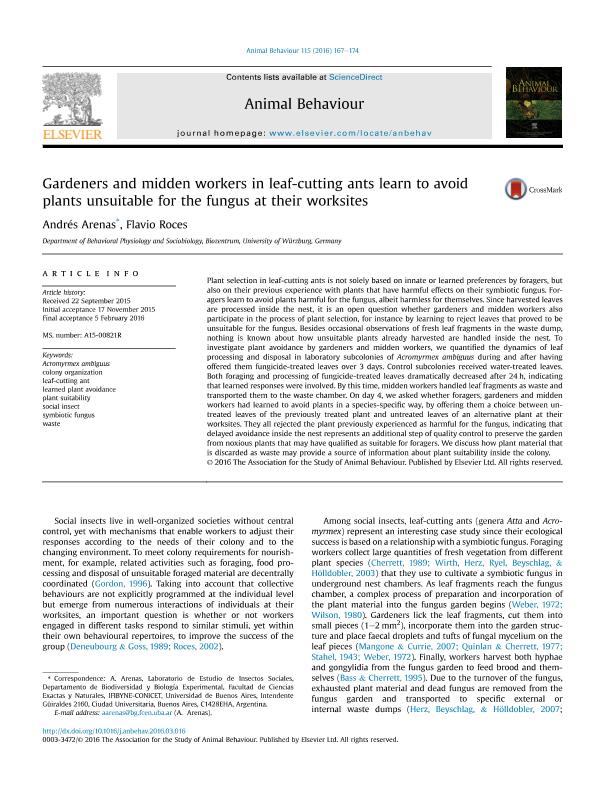Artículo
Gardeners and midden workers in leaf-cutting ants learn to avoid plants unsuitable for the fungus at their worksites
Fecha de publicación:
05/2016
Editorial:
Academic Press Ltd - Elsevier Science Ltd
Revista:
Animal Behaviour
ISSN:
0003-3472
Idioma:
Inglés
Tipo de recurso:
Artículo publicado
Clasificación temática:
Resumen
Plant selection in leaf-cutting ants is not solely based on innate or learned preferences by foragers, but also on their previous experience with plants that have harmful effects on their symbiotic fungus. Foragers learn to avoid plants harmful for the fungus, albeit harmless for themselves. Since harvested leaves are processed inside the nest, it is an open question whether gardeners and midden workers alsoparticipate in the process of plant selection, for instance by learning to reject leaves that proved to be unsuitable for the fungus. Besides occasional observations of fresh leaf fragments in the waste dump, nothing is known about how unsuitable plants already harvested are handled inside the nest. To investigate plant avoidance by gardeners and midden workers, we quantified the dynamics of leaf processing and disposal in laboratory subcolonies of Acromyrmex ambiguus during and after havingoffered them fungicide-treated leaves over 3 days. Control subcolonies received water-treated leaves. Both foraging and processing of fungicide-treated leaves dramatically decreased after 24 h, indicating that learned responses were involved. By this time, midden workers handled leaf fragments as waste and transported them to the waste chamber. On day 4, we asked whether foragers, gardeners and middenworkers had learned to avoid plants in a species-specific way, by offering them a choice between untreated leaves of the previously treated plant and untreated leaves of an alternative plant at their worksites. They all rejected the plant previously experienced as harmful for the fungus, indicating that delayed avoidance inside the nest represents an additional step of quality control to preserve the garden from noxious plants that may have qualified as suitable for foragers. We discuss how plant material that is discarded as waste may provide a source of information about plant suitability inside the colony.
Palabras clave:
Hormigas Cortadoras de Hojas
,
Aprendizaje de Evitación
,
Hongo Simbionte
Archivos asociados
Licencia
Identificadores
Colecciones
Articulos(IFIBYNE)
Articulos de INST.DE FISIOL., BIOL.MOLECULAR Y NEUROCIENCIAS
Articulos de INST.DE FISIOL., BIOL.MOLECULAR Y NEUROCIENCIAS
Citación
Arenas, Andres; Roces, Flavio; Gardeners and midden workers in leaf-cutting ants learn to avoid plants unsuitable for the fungus at their worksites; Academic Press Ltd - Elsevier Science Ltd; Animal Behaviour; 115; 5-2016; 167-174
Compartir
Altmétricas




